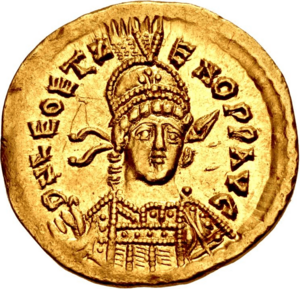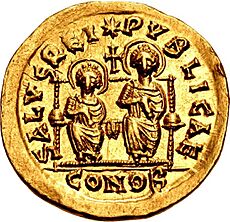Leo II (emperor) facts for kids
Quick facts for kids Leo II |
|||||
|---|---|---|---|---|---|

Solidus of Leo II, marked: d·n· leo et zeno p·p· aug·
|
|||||
| Roman emperor of the East | |||||
| Augustus | 17 November 473 – November 474 |
||||
| Coronation | 17 November 473 | ||||
| Predecessor | Leo I | ||||
| Successor | Zeno | ||||
| Alongside |
See list
|
||||
| Caesar | October 472 – November 473 | ||||
| Born | c. 467 | ||||
| Died | November 474 (aged 7) Constantinople |
||||
| Burial | Church of the Holy Apostles | ||||
|
|||||
| Dynasty | Leonid | ||||
| Father | Zeno | ||||
| Mother | Ariadne | ||||
Leo II (born around 467 – died 474), also known as the Younger, was a Roman emperor. He ruled the Eastern Roman Empire for a short time, from 473 to 474.
Leo II was the son of Zeno, who would later become emperor himself. His mother was Ariadne, the daughter of Emperor Leo I.
On November 17, 473, Leo II became co-emperor with his grandfather, Leo I. When Leo I passed away on January 18, 474, Leo II became the sole emperor. His father, Zeno, was then made co-emperor on January 29. They ruled together briefly until Leo II died later in 474.
Contents
Becoming Emperor: Leo II's Rise to Power
Leo II was born around the year 467. His father, Zeno, was a general from a region called Isauria. His mother, Ariadne, was the daughter of the emperor at the time, Leo I. This made Leo II the grandson of Emperor Leo I and Empress Verina.
Because he was the grandson of the emperor, Leo II had a strong claim to the throne. Emperor Leo I was getting sick and needed to choose someone to rule after him. He decided not to choose his son-in-law, Zeno, because Zeno was not very popular.
So, around October 472, Leo I made Leo II a caesar. This meant Leo II was the official heir to the throne. Then, in November 473, Leo I promoted him to augustus. This made Leo II a co-emperor alongside his grandfather.
Leo II's Coronation and Short Reign
Leo II's coronation ceremony took place at the Hippodrome of Constantinople. This was a large stadium in the capital city. The ceremony was led by Acacius, a very important religious leader. Historical records describe his coronation as augustus in detail, dating it to November 17, 473. Around this time, he was also chosen to be the only consul for the year 474.
Emperor Leo I died on January 18, 474. He passed away from an illness called dysentery. After his grandfather's death, Leo II became the sole emperor.
However, Leo II was very young. Some historians believe his father, Zeno, was the real power behind the throne during this time. On January 29, 474, the Byzantine Senate agreed to make Zeno a co-emperor with Leo II. This was because Leo II was too young to sign official documents on his own.
The Death of Leo II
Leo II died in Constantinople sometime in late 474. He was only about seven years old when he passed away. Different historical accounts give slightly different dates for his death, but it was likely in November or December of that year.
Because Leo II died so soon after becoming emperor, some modern scholars have wondered if he was poisoned. However, there are no records from that time that suggest this. People at the time did not suspect foul play, even though Zeno was not very popular. It is generally believed that Leo II died from natural causes. Sadly, many children did not survive to adulthood during that period.
After Leo II's death, his father Zeno became the sole emperor.
Zeno's Rule After Leo II
Zeno was not very popular as an emperor. He was seen as an outsider because he was from Isauria. His main connection to the imperial family was through his marriage to Ariadne and his son, Leo II, who had now passed away. Also, the government's treasury was empty when he took full control.
Many people opposed Zeno's rule. In January 475, Verina, the widow of Leo I, supported her brother Basiliscus to become emperor instead. Zeno had to flee the capital. Basiliscus ruled for about 20 months. But Zeno eventually returned and took back the throne.
Zeno's time as emperor was full of challenges and unrest. He managed to rule for 17 years by being clever and sometimes using bribery. He died on April 9, 491.
See also
 In Spanish: León II (emperador) para niños
In Spanish: León II (emperador) para niños
 | Georgia Louise Harris Brown |
 | Julian Abele |
 | Norma Merrick Sklarek |
 | William Sidney Pittman |


